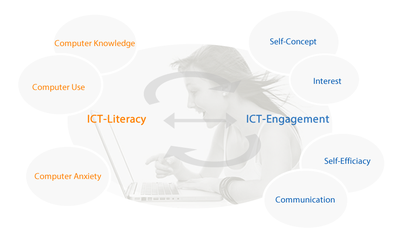KoMo ICT
The project aims at the empirical investigation of cognitive and motivational facets of ICT literacy, i.e. the ability of a competent use of information and communication technologies.
Project description
The project focusses on two aspects: On the one hand, how adolescents can be motivated to use different digital media, what is described by the construct ICT engagement. On the other hand, the research interest is on describing the relations of different motivational aspects of ICT engagement (i.e., interest and self-concept concerning the own computer skills) with the development of ICT competence, respectively, literacy. The so-called ICT- literacy can be understood as an individual competence, i.e. the individual learnable knowledge, skills and routines that are necessary to solve accordant tasks successfully. It is assumed that besides cognitive also motivational aspects affect the development of ICT- literacy.

Objectives
In more detail, considering the introduced research framework the following objectives are pursued and treated on an empirical basis:
- Development and conceptualisation of ‘ICT-engagement’ as a multidimensional concept, which indicates the ICT- specific, motivational aspects: e.g. the individual interest in ICT, the self-concept (the perceived ability concerning ICT), the perceived autonomy as well as ICT-related social activities of teenagers
- Development and testing of instruments for capturing motivational facets, connected to ICT- literacy (ICT-engagement)
- Description and verification of relations between different motivational facets and ICT-literacy (e.g. description of relations between motivational aspects and basic computer skills, ICT-related knowledge and other behavioral variables)
- Analysis of individual differences (e.g. describing gender differences)
Methodological approach
Subsequent to the theoretic- conceptual start of the project and the definition of the ICT-engagement concept, items and questionnaires have been developed. For the empirical testing and a first validation of the newly developed scales, a computer-based assessment has been conducted with tests and questionnaires measuring cognitive and motivational facets of pupils (secondary school and grammar school) from Baden-Württemberg (N=446). After data processing, the analysis of item- and scale- properties as well as the verification of the dimensional structure of ICT-engagement followed in the second project stage. On this basis, the analysis of the data regarding the raised research questions as well as the related documentation is scheduled for the third stage.
Co-operation
Based on the main research focus co-operations exist towards different, internationally oriented large scale assessments. Thus, Frank Goldhammer and Gabriela Christoph are part of the international team of item developers in PISA 2015 as well as responsible for the planning and development of the questionnaire regarding the familiarity with informational and communication technologies (‚ICT-Familiarity Questionnaire’). Within the scope of the consortial participation of ICILS 2013 (International Computer and Information Literacy Study) the research focus forms a part of the national supplementary study on the basis of internal development work.
Funding
Centre for International Student Assessment (ZIB)
Further Links
Project Details
| Status: |
Completed Projects
|
|---|---|
| Department: | Teacher and Teaching Quality |
| Duration: |
12/2012 – 12/2016
|
| Funding: |
External funding
|